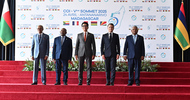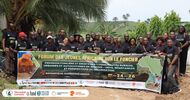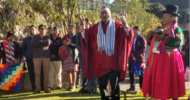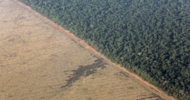The Global convergence of struggles for land and water calls on President Koroma to end the criminalisation of MALOA activists resisting Socfin in Sierra Leone.
The African Institute for Agrarian Studies brought Southern scholars, activists, practitioners, and farmers to Harare, Zimbabwe to learn from each other’s work and experiences to advance social justice projects for the rural global South.
The Atama plantation may never happen, but that uncertainty hasn’t prevented investors from potentially making a profit by clearing native forests and ruining ideal gorilla and chimpanzee habitat.
- Mongabay
-
05 February 2016
A Sierra Leone court has convicted six people opposed to a palm oil project in which French conglomerate Bollore owns a major stake of destroying trees and inciting the local population to protest over land rights.
Kazakh authorities recently amended farm sector legislation allowing the country to prolong land leases for foreign investors from 10 to 25 years.
- Astana Times
-
02 February 2016
A caravan by the Global Convergence of Land and Water Struggles – West Africa will go across the region to get the voices of communities heard and engage national authorities to stop land grabbing
The Global Convergence of Land and Water Struggles – West Africa invites you to join the West African Caravan for Land, Water and Seeds, which will mobilize 15 countries of the sub-region in March 2016
A Chinese company with strong links to the family of Li Ka-shing, one of Asia’s richest men, is on the verge of securing farms covering almost 70,000ha after the biggest single offering of freehold land in Western Australia’s history.
- West Australian
-
21 January 2016
The property of a Dutch agricultural company, Solagrow, was torched by hundreds of people, angered by the company having fenced off 100 hectares of prime communal grazing land, leased by the government.
In what looks to be a prelude to the "water wars," Saudi Arabia has been buying up farmland in the southwestern part of the U.S. to grow alfalfa hay that is then shipped back to Saudi Arabia to feed its dairy cattle because it doesn't have enough water.
- Digital Journal
-
18 January 2016
Northern NSW premium meat exporter Bindaree Beef set up a 10,000 square metre cutting-edge facility in QingDao, North Eastern China, aimed at value-adding Australian beef, is due to be finished by the end of 2016.
- Farm Weekly
-
18 January 2016
The Overseas Investment Office has granted consent for Weihai Station to buy 595 hectares of land at 152 Baker Rd, Waikaretu - about 100km southwest of Auckland, New Zealand.
Human Rights Watch says that foreign-owned commercial farms were looted and destroyed near Debre Zeit, 50 kilometers southeast of Addis Ababa, as protests against a mega development project continue in Ethiopia.
A petition denouncing the unjust imprisonment of three Ethiopian human rights defenders is being presented this week to the Ethiopian government as well as its financial backers.
Chinese businessman Lu Xianfeng said he wants to increase production, to meet a booming Chinese demand.
This is the question addressed by researchers and activists at a recent IDRC Workshop on Large-scale Land Acquisitions (LSLAs) and Accountability in Africa, in Dakar, Senegal on 24-25 November 2015.
To mark the International Human Rights Day today, peasant and indigenous groups are filing cases to seek justice for victims of human rights violations related to land conflicts.
Oil palm plantations have sprung up at breakneck speed across Indonesia’s ravaged hinterlands, eating away at the forests and propelling this country of 250 million to become the world’s sixth-largest emitter of greenhouse gases.
- Mongabay
-
07 December 2015
Youth leaders in the West Sepik Province spent the last 3 months of 2015, spreading the word on the importance of protecting their customary land and how land has been taken throughout the country through Special Agriculture Business Leases (SABL).
Wanjin Agricultural Development Company operates 10 farms in a venture with Zimbabwe's Ministry of Defense with a total land size exceeding 10,000 ha and it hopes to have acquired 40,000 ha more by 2018.
One Thousand & One Voices (1K1V) — a US-based private capital fund backed by some influential family investors — is on the hunt for opportunities in the sub-Saharan Africa agricultural sector.
- Business Day
-
25 November 2015
The EcoEnergy project was announced in 2011, with those to be displaced told they could expect compensation within 18 months. It has stalled, hamstrung by red tape and legal delays.
- Africa Report
-
25 November 2015
The Economic Community for West African States has agreed to provide the Foundation for African Development Aid US$25 million to revamp a rice project originally financed by the Libyan African Investment Portfolio.
- Hot Pepper
-
23 November 2015
The world’s biggest sustainable palm oil organization is accused of ignoring flaws within its certification process that have allowed oil palm companies to hide significant violations of the body’s own sustainability standards behind its seal of approval.
- Mongabay
-
16 November 2015
A New York company managing the retirement savings of workers in Sweden, the US and Canada is evading Brazilian laws on foreign investment to acquire farmlands from a businessman accused of violently displacing local communities.
Already, investors in Brazil, Guyana's neighbour to the south and south west, have indicated their willingness to invest in the intermediate and Rupununi savannahs.
- 4-Traders
-
09 November 2015
Nasako Besingi of the NGO Struggle to Economize our Future Environment (SEFE) was sentenced today for defamation by the SGSOC Company, a subsidiary of Herakles Farms of the US.
Racecourse Projects, owned by Cargill's Black River Asset Management and Mackay Sugar, has purcahsed a 3,244 hectare cattle property in North Queensland.
A new video by LifeMosaic, part of the series “Territories of Life“, looks at the impacts of the enormous land grab affecting indigenous peoples around the world.
- REDD Monitor
-
22 October 2015
The oil palm industry’s rapid growth in West Papua, Indonesia is having serious adverse effects on its indigenous population.
















